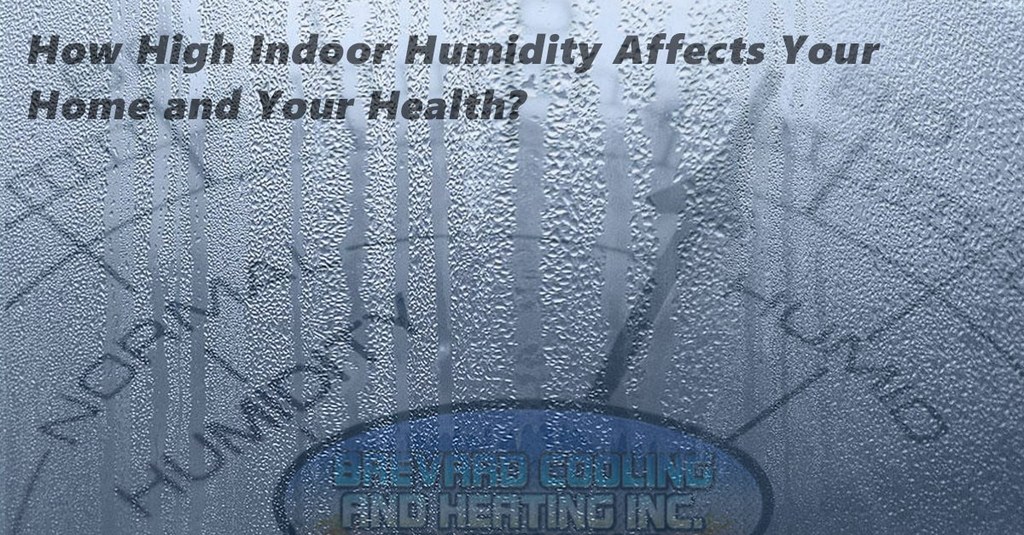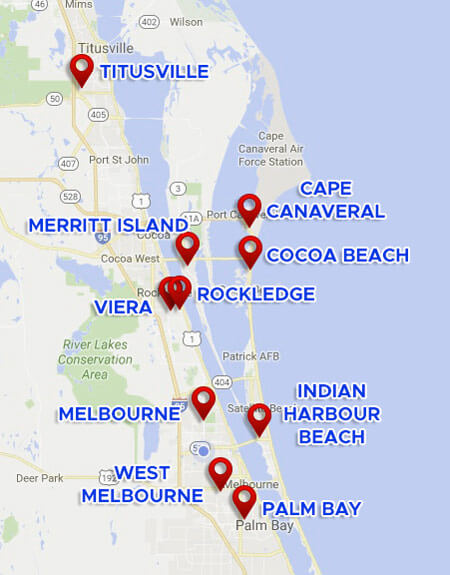How High Indoor Humidity Affects Your Home and Your Health
Posted: November 13, 2015

Brevard County residents know all about the suffering that comes with high humidity: The sticky skin, the labored breathing, the impossibility of getting dry once you step out of the shower. The driest period for our region is mid-April, when the relative humidity is below 75 percent three out of four days, and the highest period is mid-August, when the relative humidity is over 90 percent for three out of four days. But even when humidity is at its lowest, it’s higher than many other regions of the country. If you’re suffering from the high humidity inside your home as well as outside, humidity may be doing more harm than you think.
What’s the Ideal Home Humidity Level?
The Environmental Protection Agency recommends a home humidity level of 30 to 50 percent, with 45 percent serving as the ideal balance between too dry and too wet.
You can gauge humidity levels in your home with a hygrometer, a tool that calculates the relative humidity of a space. If you don’t have a hygrometer and aren’t in a hurry to rush out and buy one, you can determine whether you have high humidity in other ways. These are a few tell-tale signs of high humidity in your home:
- Condensation on the windows and other vertical glass surfaces.
- Wet stains or droplets on ceilings and walls.
- Rapid mold and mildew growth in the kitchen, bathroom, and other damp spaces.
- Allergy symptoms that are more intense than usual.
How High Humidity Affects Your Home
If your home is too humid, your rooms may smell musty. Condensation on windows, mirrors, walls, and ceilings can cause unsightly water and droplet stains, and drinking glasses that sweat leave those unsightly tell-tale rings on your nice tables when the coaster can’t handle the water load. Painted surfaces may crack, peel, or blister, and your wood floors, furniture, and trim may swell and warp. Mold and mildew will grow faster than the weeds in your garden.
High humidity is no good for your energy bills, either. Your air conditioner removes some humidity from your home as air moves over the evaporator coil and moisture is drawn out and drips from the coil into the condensate pan. But high humidity can make your air conditioner work harder by having to cool heavy, wet air, increasing the wear on the system and sending your cooling costs through the roof.
How High Humidity Affects Your Health
Mold and mildew love high humidity, and these growths in turn provide bacteria with an ideal growing environment, which dramatically reduces your indoor air quality and can lead to or worsen a number of respiratory illnesses, according to the EPA.
Perhaps worst of all, high humidity is the preferred environment for dust mites. These microscopic arachnids thrive in high humidity, multiplying faster than a room full of bunnies. Dust mites feed on dead human skin cells, which means that your bed is the smorgasbord of choice for the little beasts, each of which leaves behind 20 highly-allergenic droppings every day. If you have high humidity, you may have as many as ten million dust mites in your bed alone, feasting, pooping, and eventually shedding their potently allergenic skins. According to the American College of Allergy, Asthma, and Immunology, 10 percent of the American population and 45 percent of those with asthma are sensitive to dust mites, which can trigger severe allergy symptoms and worsen asthma and other respiratory conditions.
The Solution to High Humidity: Dehumidification
Using portable dehumidifiers or installing a whole-house model is the best solution for high humidity and the problems that come along with it. Dehumidifiers work by drawing warm, humid air over an icy cold coil. The moisture in the air condenses into a liquid and drips from the coil into a collection tub, in the case of a portable unit, or into the condensate drain, in the case of a whole-house system. The dry air is blown back into the room.
The capacity of a dehumidifier is measured in pints of moisture removed in 24 hours. Very damp spaces like a bathroom, basement, or attic will need a dehumidifier with a higher capacity, while larger rooms with adequate airflow can get by with a smaller capacity.
Dehumidifiers are available in portable models that you can place in the most humid areas of your home and whole-house models that are installed directly into your HVAC system and remove moisture from the air in all of your rooms.
Portable Dehumidifiers: Pros and Cons
Portable dehumidifiers are fairly inexpensive, and they can be placed where they’re needed the most. They’re very easy to use–you simply plug it in and turn it on.
The drawbacks of portable dehumidifiers include the need to empty the collection container, which can fill up in a matter of hours (you can use the water to keep your plants hydrated.) A portable dehumidifier needs to be maintained regularly to prevent the growth of mold and mildew. Portable units are a bit noisy, and they’re not exactly the prettiest things taking up space in your rooms, and some units aren’t very energy efficient when compared to whole-house systems.
Whole House Dehumidifiers: Pros and Cons
A whole-house dehumidifier offers hands-free humidity control. The unit is situated inside the HVAC system, so it won’t be an eyesore, and you won’t hear a peep out of it. It drains right into the condensate pan of the A/C unit, so you don’t have a bucket to empty one or more times a day, and it improves your indoor air quality through optimum air filtration. A whole-house unit is more energy efficient than a portable unit, so the energy savings will be considerably higher.
It requires very little maintenance and can be cleaned and fine-tuned during your annual A/C tune-up.
The major drawback of a whole-house dehumidifier is the high up-front cost, compared to a portable unit. It requires professional installation, further increasing the cost. However, an Energy Star system will use very little energy, and the energy savings you’ll gain by easing the cooling load on your air conditioner will eventually pay for the whole-house system.
Ready to Dehumidify?
For more expert information about dehumidification, please feel free to contact us at Brevard Cooling & Heating. We can help you determine the best place to use a portable dehumidifier as well as help you calculate the capacity you’ll need. We also have a range of whole-house systems and can help you choose the best one, depending on your needs and your budget. We strive to improve the comfort of all of our Brevard County neighbors, and if humidity has you singing the sticky summer blues, we’ll be happy to turn that sad song into a happy little jig.
Have a specific Heating, Ventilating, & Air Conditioning related question?
Ask a Professional. We’re here to help! Call anytime day or night (321) 757-9008

